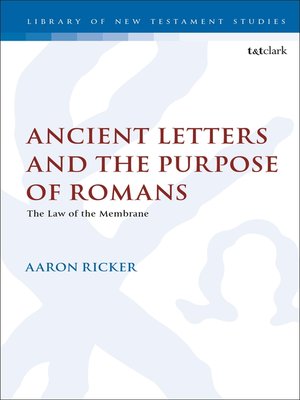Ancient Letters and the Purpose of Romans
ebook ∣ The Law of the Membrane · The Library of New Testament Studies
By Aaron Ricker

Sign up to save your library
With an OverDrive account, you can save your favorite libraries for at-a-glance information about availability. Find out more about OverDrive accounts.
Find this title in Libby, the library reading app by OverDrive.



Search for a digital library with this title
Title found at these libraries:
| Library Name | Distance |
|---|---|
| Loading... |
Aaron Ricker locates the purpose of Romans in its function as a tool of community identity definition. Ricker employs a comparative analysis of the ways in which community identity definition is performed in first-century association culture, including several ancient network letters comparable to Romans.
Ricker's examination of the community advice found in Rom 12-15 reveals in this new context an ancient example of the ways in which an inscribed addressee community can be invited in a letter to see and comport itself as a "proper" association network community. The ideal community addressed in the letter to the Romans is defined as properly unified and orderly, as well accommodating to – and clearly distinct from – cultures "outside." Finally, it is defined as linked to a proper network with recognised leadership (i.e., the inscribed Paul of the letter and his network). Paul's letter to the Romans is in many ways a baffling and extraordinary document. In terms of its community-defining functions and strategies, however, Ricker shows its purpose to be perfectly clear and understandable.
Ricker's examination of the community advice found in Rom 12-15 reveals in this new context an ancient example of the ways in which an inscribed addressee community can be invited in a letter to see and comport itself as a "proper" association network community. The ideal community addressed in the letter to the Romans is defined as properly unified and orderly, as well accommodating to – and clearly distinct from – cultures "outside." Finally, it is defined as linked to a proper network with recognised leadership (i.e., the inscribed Paul of the letter and his network). Paul's letter to the Romans is in many ways a baffling and extraordinary document. In terms of its community-defining functions and strategies, however, Ricker shows its purpose to be perfectly clear and understandable.







